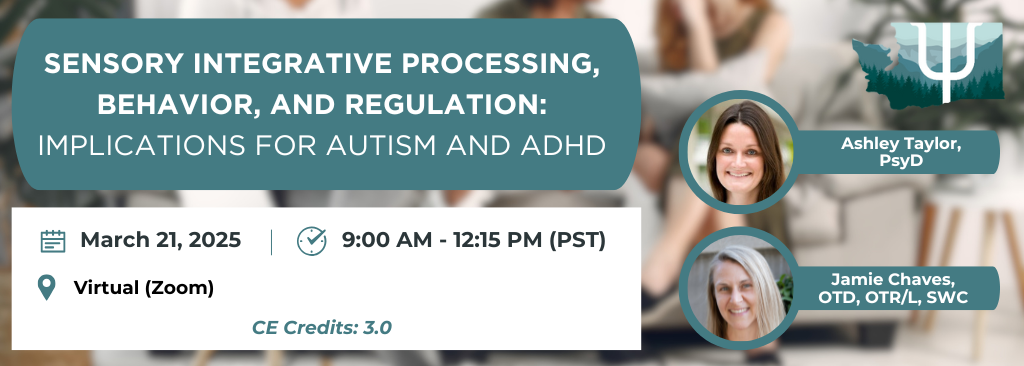Event Description

Sensory Integrative Processing, Behavior, and Regulation: Implications for Autism and ADHD
CE Credits: 3.0
Sensory integrative processing is foundational to how we learn about our bodies, engage with the environment, interact with others, make meaning out of activities, produce motor responses, and participate in learning. It also has direct links with our regulation and influences our behavior. Yet, deciphering sensory integrative processing-- and the 8 sensory systems that it includes-- can be quite challenging. And, it’s often overlooked or misdiagnosed. What does sensory integrative processing actually involve? Why is it so vital for behavior responses, emotional regulation, and learning? How can you better understand and influence the sensory integrative processing needs of clients with ASD and ADHD, and yourself, to best guide treatment planning?
There is a high percentage of neurodivergent individuals who also have vulnerabilities in sensory processing, however, this is often an overlooked or misunderstood area. In fact, research suggests that up to 40-60% of children who have ADHD also have Sensory Processing Disorder (SPD); however, this diagnosis not identified in the DSM-5 (or ICD). Additionally, up to 90% of people with ASD also have sensory differences. As mental health professionals, in order to provide trauma-informed and neurodiversity affirming care, we must better understand sensory processing differences. In this presentation we will guide you on what to look for, when to refer, and how to integrate sensory strategies into our own therapy rooms.
Presented by: Ashley Taylor, PsyD & Jamie Chaves, OTD, OTR/L, SWC
 Dr. Taylor is the Executive Director and founder of Wonder Tree Developmental Psychology. With locations on the west coast, in Washington State and California, she leads the team through a reflective, collaborative, and culturally informed lens. She specializes in providing comprehensive, holistic, developmental, psychological and psycho-educational evaluations and mental health care for children, adolescents, and adults. She and her team are dedicated to engaging in ongoing reflective training and consultation so that they can provide high quality, neurodiversity affirming, and comprehensive care for the families they work with.
Dr. Taylor is the Executive Director and founder of Wonder Tree Developmental Psychology. With locations on the west coast, in Washington State and California, she leads the team through a reflective, collaborative, and culturally informed lens. She specializes in providing comprehensive, holistic, developmental, psychological and psycho-educational evaluations and mental health care for children, adolescents, and adults. She and her team are dedicated to engaging in ongoing reflective training and consultation so that they can provide high quality, neurodiversity affirming, and comprehensive care for the families they work with.Dr. Taylor has recently become a yoga teacher. She enjoys helping others facilitate a strong mind-body connection. She lives in Southwest Washington and enjoys spending time with her family, pets, going hiking, snowboarding, and doing yoga.
 A native of Illinois, Dr. Chaves attended undergraduate at Bradley University with degrees in Health Science and Psychology. She earned her Doctorate in Occupational Therapy (OTD) at Washington University in St. Louis School of Medicine. She is currently associated with End Picky Eating, an early intervention program in north county San Diego, and WonderTree Developmental Psychology, a clinic where she implements the Safe and Sound Protocol (SSP). Much of her thirteen year career as an occupational therapist has been rooted in sensory integration theory and practice. She has recently completed her ProCert 1 training at the STAR Institute, the premier research center for sensory integrative processing, in Denver, CO. Learning is truly one of her passions, and she understands that collaborating with an integrated team is the key to holistic care — she offers one of many important pieces to the puzzle. In 2020 and 2021 she co-authored The Why Behind Classroom Behaviors and Creating Sensory Smart Classrooms, respectively, in order to support and equip educators who have students with various learning needs. When she’s not working, you can often find Dr. Chaves with her three young kids at the beach, Legoland, or any playground around San Marcos, CA. Running is what she does to regulate and reflect — it's in her bones.
A native of Illinois, Dr. Chaves attended undergraduate at Bradley University with degrees in Health Science and Psychology. She earned her Doctorate in Occupational Therapy (OTD) at Washington University in St. Louis School of Medicine. She is currently associated with End Picky Eating, an early intervention program in north county San Diego, and WonderTree Developmental Psychology, a clinic where she implements the Safe and Sound Protocol (SSP). Much of her thirteen year career as an occupational therapist has been rooted in sensory integration theory and practice. She has recently completed her ProCert 1 training at the STAR Institute, the premier research center for sensory integrative processing, in Denver, CO. Learning is truly one of her passions, and she understands that collaborating with an integrated team is the key to holistic care — she offers one of many important pieces to the puzzle. In 2020 and 2021 she co-authored The Why Behind Classroom Behaviors and Creating Sensory Smart Classrooms, respectively, in order to support and equip educators who have students with various learning needs. When she’s not working, you can often find Dr. Chaves with her three young kids at the beach, Legoland, or any playground around San Marcos, CA. Running is what she does to regulate and reflect — it's in her bones.Learning Objectives:
Participants will be able to:
- Build knowledge around neurodiversity and integrating neurodiversity affirming care into your practice.
- Gain knowledge of the sensory systems by:
- Identifying the 8 sensory systems and 3 corresponding areas of sensory integration
- Experience 4 sensory integrative processing differences and explain how they influence regulation and learning
- Delineate the developmental progression of sensory processing
- Explain how regulation and relationships influence sensory integrative processing (and vice versa) by:
- Identifying behavior outputs, cues, and signs of distress in students/adults with sensory processing difference
- List behavior outputs and signs of distress in students/adults with sensory processing differences
- Identify ways to integrate knowledge of sensory systems into the therapy room by:
- Understanding when collaborating with an occupational therapist is appropriate
- Identifying 3 techniques, accommodations, or environmental adaptations you can use to influence learning, treatment, and engagement of one of your clients
- Differentiating between ADHD, ASD, and SPD; increasing knowledge of differential diagnosis
| 3.0 CE Credits | Regular Pricing |
|---|---|
| Non-Member | 145.00 |
| Basic Member | 115.00 |
| Premium Member | 95.00 |
| Platinum Member | 95.00 |
| Post Doc/Retired/Emeritus Member | 85.00 |
| Post Grad | 75.00 |
| Member Student | 35.00 |
Cancelation policies
Refund request due to special circumstances will be evaluated on a case by case basis. Refunded fees may be applied to new membership dues or membership dues renewal.
 The Washington State Psychological Association (WSPA) is approved by the American Psychological Association to sponsor continuing education for psychologists. WSPA maintains responsibility for this program and its content.
The Washington State Psychological Association (WSPA) is approved by the American Psychological Association to sponsor continuing education for psychologists. WSPA maintains responsibility for this program and its content.
Location
Setting: Live Virtual
Online - Link included in Registration Confirmation Email
Online - Link included in Registration Confirmation Email
Contact Person
WSPA
(phone: 2065474220)
(phone: 2065474220)
Email Reminder